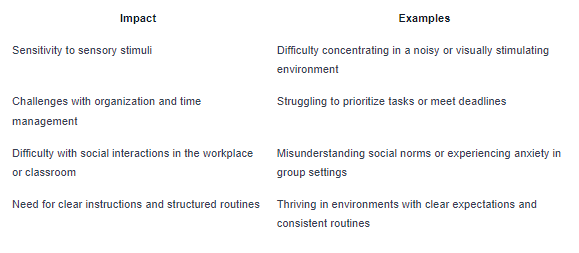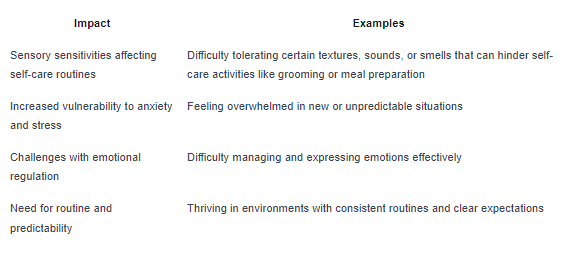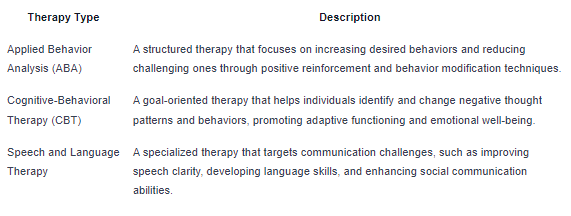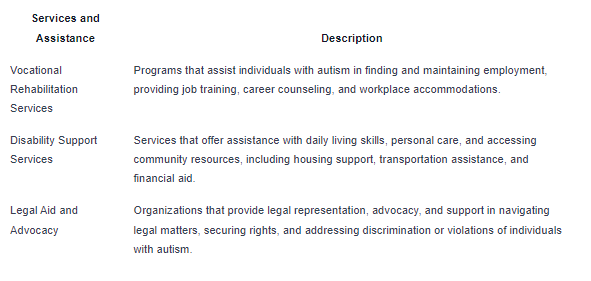Signs and Symptoms of Autism in Adults
Unveiling the signs and symptoms of autism in adults. Discover the impact on daily life and find support for a brighter future.

Understanding Autism in Adults
Autism Spectrum Disorder (ASD) is a neurodevelopmental disorder that affects individuals across their lifespan. While autism is often associated with childhood, it is crucial to understand and recognize the signs and symptoms of autism in adults. This section provides an overview of Autism Spectrum Disorder and emphasizes the importance of identifying autism in adults.
Overview of Autism Spectrum Disorder (ASD)
Autism Spectrum Disorder (ASD) is a complex developmental condition characterized by challenges in social interaction, communication, and restricted and repetitive behaviors. It is considered a spectrum disorder because the severity and manifestation of symptoms vary from person to person.
Some common symptoms and characteristics of ASD include:
- Difficulties in social interactions, such as maintaining eye contact, understanding social cues, and engaging in reciprocal conversations.
- Challenges in communication, both verbal and nonverbal, including difficulties with expressive and receptive language skills.
- Restricted and repetitive behaviors, such as repetitive movements, adherence to strict routines, and intense interests in specific topics.
ASD is a lifelong condition, and while some individuals may require significant support, others may have milder symptoms and lead independent lives. Early intervention and appropriate support services can greatly enhance the quality of life for individuals with autism.
Importance of Recognizing Autism in Adults
Recognizing autism in adults is crucial for several reasons. Firstly, there are individuals who may have been undiagnosed in childhood and have lived their lives without understanding their unique neurodivergent traits. Identifying autism in adulthood can provide them with a sense of clarity and self-understanding.
Secondly, recognizing autism in adults allows for access to appropriate support and services. Many individuals with autism struggle with various aspects of daily life, including relationships, employment, and mental health. By recognizing their autism, individuals can seek tailored interventions and therapies that address their specific needs.
Furthermore, understanding autism in adults promotes acceptance, inclusivity, and understanding within society. It helps to dispel myths and misconceptions surrounding autism, fostering a more supportive and accommodating environment for individuals on the spectrum.
By gaining a better understanding of Autism Spectrum Disorder and recognizing the signs and symptoms in adults, we can promote early identification, access to support services, and a more inclusive society for individuals with autism.
Recognizing Signs and Symptoms
Recognizing the signs and symptoms of autism in adults is essential for early identification and appropriate support. Autism Spectrum Disorder (ASD) manifests differently in each individual, and the symptoms may vary in severity. Here are three key areas to look out for when recognizing autism in adults: social communication challenges, repetitive behaviors and interests, and sensory sensitivities.
Social Communication Challenges
Adults with autism may experience difficulties in social communication. They may struggle with understanding and using nonverbal cues, such as facial expressions, gestures, and tone of voice. Some common signs of social communication challenges in adults with autism include:
- Difficulty initiating or maintaining conversations.
- Limited eye contact or a preference for avoiding eye contact.
- Difficulty understanding sarcasm, irony, or figurative language.
- Taking conversations too literally.
- Challenges in understanding and responding appropriately to social cues.
Understanding and accommodating these social communication challenges can help create a more inclusive and supportive environment for individuals with autism.
Repetitive Behaviors and Interests
Repetitive behaviors and interests are often observed in adults with autism. These behaviors can manifest in various ways and may serve as a way for individuals to cope with anxiety or sensory overload. Some signs of repetitive behaviors and interests in adults with autism include:
- Engaging in repetitive movements, such as hand flapping, rocking, or spinning.
- Adhering to strict routines or rituals and becoming distressed when these routines are disrupted.
- Developing intense and narrow interests in specific topics or objects.
- Displaying repetitive speech patterns or echolalia (repeating words or phrases).
Understanding and accepting these repetitive behaviors and interests as part of the individual's unique neurodiversity can contribute to their well-being and overall quality of life.
Sensory Sensitivities
Sensory sensitivities are common in individuals with autism and can significantly impact their daily lives. Sensory experiences that may be tolerable for neurotypical individuals can be overwhelming or distressing for adults with autism. Some signs of sensory sensitivities in adults with autism include:
- Hypersensitivity or hyposensitivity to certain sounds, lights, textures, or smells.
- Difficulty filtering out background noise or sensory input, leading to sensory overload.
- Strong reactions to certain sensory stimuli, such as covering ears or avoiding certain textures.
- Seeking or avoiding specific sensory experiences to regulate sensory input.
Understanding and accommodating sensory sensitivities can help create a more comfortable and supportive environment for individuals with autism.
Recognizing these signs and symptoms is crucial in providing appropriate support and understanding for adults with autism. By promoting awareness and understanding, we can contribute to a more inclusive society that values and supports the neurodiversity of all individuals.
Diagnosis and Assessment
When it comes to diagnosing autism in adults, there are unique challenges that professionals face due to the complexities of the disorder and the varied presentation of symptoms. However, with an understanding of the challenges and a comprehensive assessment process, accurate diagnoses can be made.
Challenges in Diagnosing Autism in Adults
Diagnosing autism in adults can be more challenging compared to diagnosing it in children. This is mainly because the symptoms of autism can be masked or mistaken for other conditions in adulthood. Additionally, adults may have developed coping strategies or learned to camouflage their difficulties, making it harder to identify the underlying autistic traits.
Here are some specific challenges in diagnosing autism in adults:
- Late Recognition: Many individuals with autism are not diagnosed until adulthood, often due to the lack of awareness or understanding of the condition in earlier years.
- Co-occurring Conditions: Adults with autism may also have other mental health conditions, such as anxiety or depression, which can complicate the diagnostic process and require careful evaluation.
- Gender Differences: Autism presents differently in males and females, and the diagnostic criteria have historically been based on male characteristics. This can lead to underdiagnosis or misdiagnosis in females, as their symptoms may be less obvious or align with different patterns.
- Masking and Camouflaging: Some adults with autism develop coping mechanisms to mask their difficulties in social situations, making it harder to recognize the underlying autistic traits during assessments.
Assessment Process for Adult Autism
To accurately diagnose autism in adults, a comprehensive assessment process is crucial. This typically involves gathering information from multiple sources, including the individual, their family or close friends, and professionals experienced in autism assessment. Here are some key components of the assessment process:
- Clinical Interviews: Detailed interviews are conducted with the individual to gather information about their developmental history, current difficulties, and experiences. Family members or close friends may also be interviewed to provide additional insights.
- Diagnostic Tools: Standardized diagnostic tools, such as the Autism Diagnostic Observation Schedule (ADOS) and the Autism Diagnostic Interview-Revised (ADI-R), are often utilized to assess the presence of autism-related symptoms.
- Observation of Behavior: Professionals observe the individual's behavior in various settings to assess social communication skills, repetitive behaviors, and sensory sensitivities. This may involve structured observations or naturalistic observations in everyday environments.
- Psychological and Cognitive Assessments: Additional assessments may be conducted to evaluate cognitive abilities, language skills, and any co-occurring mental health conditions that may be present.
- Collaboration and Multi-Disciplinary Approach: The assessment process often involves collaboration between professionals from different disciplines, such as psychologists, psychiatrists, speech-language pathologists, and occupational therapists. This interdisciplinary approach helps ensure a comprehensive evaluation.
It's important to note that the assessment process may vary depending on the individual's specific needs and the resources available. The goal is to gather a comprehensive understanding of the individual's strengths, challenges, and overall functioning to make an accurate diagnosis.
By recognizing the challenges associated with diagnosing autism in adults and following a thorough assessment process, healthcare professionals can provide individuals with the appropriate support, interventions, and resources they need to thrive.
Impact on Daily Life
Living with autism as an adult can have a significant impact on various aspects of daily life. Understanding and recognizing these impacts is crucial for providing appropriate support and creating inclusive environments. In this section, we will explore the effects of autism on relationships and social interactions, employment and academic settings, as well as self-care and mental health.
Relationships and Social Interactions
Autism can present unique challenges in forming and maintaining relationships, as well as navigating social interactions. Adults with autism may experience difficulties in understanding social cues, expressing emotions, and establishing meaningful connections. These challenges can affect friendships, romantic relationships, and family dynamics.

Employment and Academic Settings
Autism can also have an impact on employment and academic settings. While individuals with autism possess unique strengths and abilities, they may face specific challenges that require support and accommodations. These challenges can affect job performance, educational attainment, and career opportunities.

Self-Care and Mental Health
Taking care of oneself and maintaining good mental health are important aspects of well-being for individuals with autism. The impact of autism on self-care and mental health can vary from person to person. Some individuals may experience heightened sensitivity to sensory stimuli, leading to sensory overload or meltdowns. Others may face challenges in managing anxiety, depression, or other mental health conditions.

Understanding the impact of autism on daily life can help create a more supportive and inclusive society. By recognizing and accommodating the unique needs of individuals with autism, we can foster a more inclusive and understanding environment that allows them to thrive and reach their full potential.
Support and Resources
Individuals with autism in adulthood can benefit from a range of support and resources to help them navigate daily life and enhance their overall well-being. Here are three key avenues for support: therapy and interventions, community and support groups, and accessing services and assistance.
Therapy and Interventions
Therapy and interventions are essential in providing individuals with autism the tools and strategies they need to thrive. Several types of therapy have been found to be effective in improving communication, social skills, and overall quality of life for adults with autism.

Community and Support Groups
Community and support groups provide a valuable network for individuals with autism and their families. These groups offer a sense of belonging, understanding, and shared experiences. They often organize events, workshops, and social activities where individuals with autism can connect with others who face similar challenges and triumphs.
Joining a support group can provide emotional support and practical advice for navigating various aspects of life with autism. It can also serve as a platform for sharing resources, advocating for rights, and raising awareness about autism in the community.
Accessing Services and Assistance
Accessing services and assistance is crucial for individuals with autism to access the support they need. It often involves connecting with professionals, organizations, and government agencies that offer specialized services and resources.

Seeking out these support and resource options can greatly contribute to the well-being and quality of life for adults with autism. It is important for individuals with autism, their families, and caregivers to explore these avenues and find the right combination of support that meets their unique needs.
Advocacy and Awareness
Raising awareness and advocating for individuals with autism is crucial to promoting acceptance, understanding, and creating inclusive environments. By shedding light on the experiences of adults with autism, we can foster a more inclusive society. In this section, we will explore three important aspects of advocacy and awareness: promoting acceptance and understanding, advocating for inclusive environments, and spreading awareness and education.
Promoting Acceptance and Understanding
Promoting acceptance and understanding involves challenging stereotypes and misconceptions surrounding autism in adults. By increasing awareness about the diverse range of strengths and challenges individuals with autism may have, we can create a more inclusive society that values neurodiversity.

Promoting acceptance and understanding also involves encouraging empathy and fostering inclusive attitudes among the general population. By educating others about the unique strengths and challenges faced by adults with autism, we can create a more compassionate and inclusive society.
Advocating for Inclusive Environments
Advocating for inclusive environments means ensuring that individuals with autism have equal opportunities to participate in various aspects of society. This includes advocating for accessible education, employment, healthcare, and recreational opportunities.
Creating inclusive environments involves:
- Promoting accommodations and supports in educational settings to ensure that individuals with autism can thrive academically.
- Encouraging employers to provide reasonable workplace accommodations and fostering inclusive hiring practices.
- Advocating for accessible healthcare services that meet the specific needs of individuals with autism.
- Supporting recreational programs and community activities that are inclusive and provide opportunities for social participation.
By advocating for inclusive environments, we can help individuals with autism fully participate in society, reach their potential, and lead fulfilling lives.
Spreading Awareness and Education
Spreading awareness and education about autism is essential for building a more inclusive society. By providing accurate information and dispelling myths, we can increase understanding and support for individuals with autism.
Education about autism can include:
- Providing information about the signs and symptoms of autism in adults, as well as the challenges they may face.
- Offering training and resources for professionals, educators, and caregivers to better support individuals with autism.
- Organizing awareness campaigns, workshops, and events to engage the community and promote understanding.
Spreading awareness and education is crucial in reducing stigma and ensuring that individuals with autism receive the support and acceptance they deserve.
By promoting acceptance and understanding, advocating for inclusive environments, and spreading awareness and education, we can work towards a society that embraces and supports individuals with autism. Empathy, education, and inclusivity are key in creating a world where everyone can thrive, regardless of their neurological differences.
Sources
https://www.nhs.uk/conditions/autism/signs/adults/
https://www.medicalnewstoday.com/articles/326841
https://www.health.com/autism-symptoms-adults-7965213
Similar articles
We’re here to help you

Our team is here to assist you in this process. Contact us for any assistance.
it’s easy to apply
We Accept Most Insurances
Our in-network insurance partnerships make ABA therapy more accessible to families throughout our service areas.







Our Insurance Process
We'll request your insurance details to help us verify your plan's coverage for ABA therapy. Once we've received this information, we'll walk you through your benefits, including copayments, deductibles and out-of-pocket maximums, so you know what to expect in advance.
Our team will then handle the preauthorization and all the necessary paperwork.
.svg)





















.jpeg)


































.jpeg)




.jpeg)







.jpeg)











.jpeg)
















